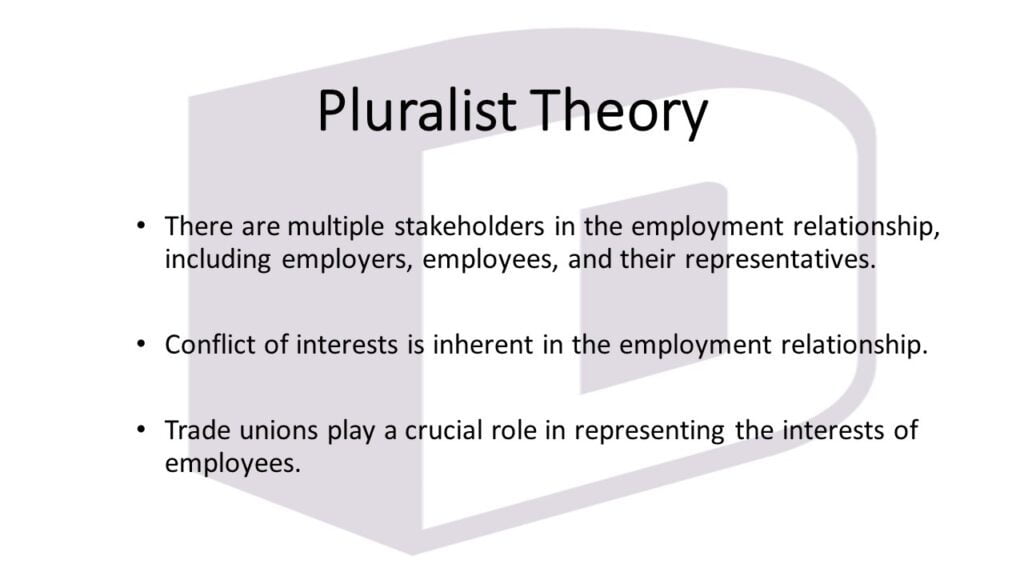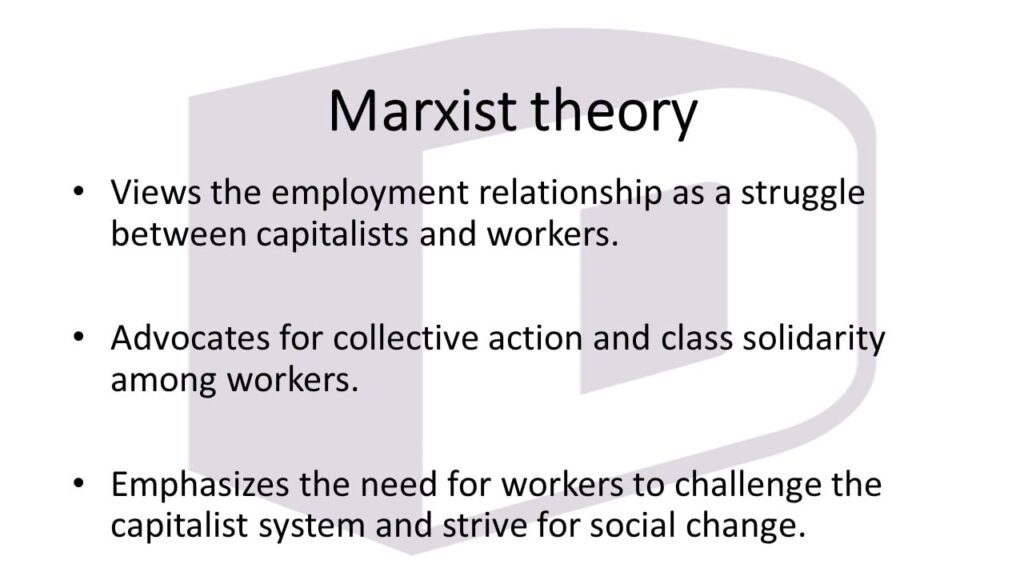There are basically 3 theories – Marxist, Unitary and Pluralist before briefing them lets take a overview of what is industrial Relations
Industrial relations refer to the study and practice of managing the employment relationship between employers and employees. There are basically 3 theories – Marxist, Unitary and Pluralist
It involves the interaction between employers, employees, and their representatives, such as trade unions and government agencies, in order to establish and maintain harmonious and productive working relationships.
The field of industrial relations encompasses various theories, including the pluralist theory, unitary theory, and Marxist theory, each with its own assumptions, characteristics, strengths, and weaknesses.
Pluralist theory of industrial relations
Assumptions:
There are multiple stakeholders in the employment relationship, including employers, employees, and their representatives.
- Conflict of interests is inherent in the employment relationship.
- Trade unions play a crucial role in representing the interests of employees.

Characteristics:
- Recognizes the existence of multiple interest groups within the workplace.
- Emphasizes collective bargaining and negotiations as a means to resolve conflicts.
- Acknowledges the importance of trade unions in representing and protecting the rights of employees.
Strengths:
- Provides a framework for balancing the interests of different stakeholders.
- Promotes employee voice and participation in decision-making processes.
- Offers a platform for resolving conflicts through negotiation and collective bargaining.
Weaknesses
- Assumes that conflicts of interests are inevitable and cannot be fully resolved.
- May lead to power imbalances between employers and trade unions.
- Relies heavily on the effectiveness of collective bargaining and negotiations.
Unitary theory of industrial relations
Assumptions:
- The employment relationship is based on shared goals and mutual interests.
- Conflict is viewed as dysfunctional and can be minimized through effective communication and management practices.
- The employer has the ultimate authority and responsibility for managing the workplace.
Characteristics:
Unitary theory Emphasizes the importance of maintaining harmonious relationships and shared goals between employers and employees.
Advocates for a unified and cooperative approach to workplace issues.
Promotes direct communication between employers and employees, without the involvement of trade unions.
Strengths:
- Fosters a sense of unity and shared purpose within the workplace.
- Encourages open communication and collaboration between employers and employees.
- Facilitates quick decision-making and problem-solving.
Weaknesses:
- Downgrade the potential conflicts of interests between employers and employees.
- Ignores the role of trade unions and collective representation in protecting employee rights.
- May not adequately address power imbalances within the employment relationship.
Marxist theory of Industrial Relations

Assumptions:
The employment relationship is inherently exploitative and characterized by class struggle.
Capitalists, who own the means of production, exploit the labor of workers to generate profits.
Trade unions are a means for workers to challenge capitalist exploitation and achieve social and economic equality.
Characteristics:
Views the employment relationship as a struggle between capitalists and workers.
Advocates for collective action and class solidarity among workers.
Emphasizes the need for workers to challenge the capitalist system and strive for social change.
Strengths:
Raises awareness about social and economic inequalities within the employment relationship.
Highlights the importance of collective action and solidarity among workers.
Provides a critique of the capitalist system and its impact on workers.
Weaknesses:
Does not provide a practical framework for resolving conflicts within the workplace.
Does not address the diversity of interests and perspectives within the workforce.
May overlook the potential for cooperation and shared interests between employers and employees.
Institutions of industrial relations
Trade unions
Trade unions are organizations made up of workers with the primary aim of protecting and advancing the interests of their members in the workplace.
They negotiate with employers on behalf of their members regarding working conditions, wages, and other employment-related issues.
Trade unions can also provide education, support, and advocacy for their members.
Employers’ organizations
Employers’ organizations represent the interests of employers and support their members in dealing with employment-related matters.
They provide a platform for employers to collaborate, share knowledge, and influence employment policies and practices.
Employers’ organizations often engage in collective bargaining with trade unions to negotiate employment terms and conditions.
Government Agencies
Government agencies play a regulatory role in industrial relations by enforcing labor laws, ensuring compliance, and resolving disputes.
They may establish and enforce minimum employment standards, mediate labor disputes, and provide support and guidance to employers and employees.
Government agencies also promote and facilitate social dialogue between employers, employees, and their representatives.
My Perspective
industrial relations involve the management of the employment relationship between employers and employees. The pluralist, unitary, and Marxist theories offer different perspectives on the nature of this relationship.
Trade unions, employers’ organizations, and government agencies are important institutions in industrial relations, each playing a distinct role in representing the interests of various stakeholders. By understanding these theories and institutions, stakeholders can navigate the
Was this helpful?
0 / 0